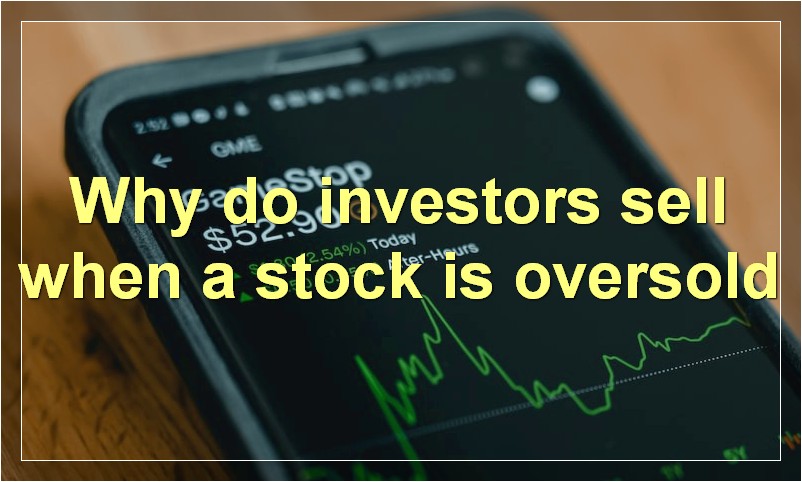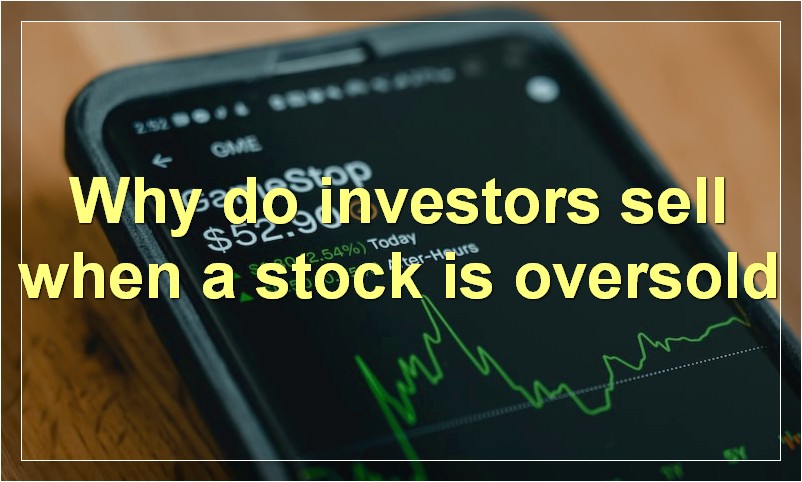If you’re looking to buy a stock that’s oversold, timing is everything. You need to be able to identify when a stock is oversold and then act quickly to take advantage of the situation. Here are some tips to help you make the most of an oversold stock.
What does it mean to be oversold
When a stock is said to be “oversold,” it means that it has been heavily sold by investors and is now undervalued. This can happen for a number of reasons, such as when a company misses earnings estimates or gives weak guidance. Oversold stocks are often seen as good buying opportunities by investors who believe that the stock will eventually rebound.
Why do investors sell when a stock is oversold

There are a few reasons why investors might sell when a stock is oversold. One reason could be that the investor is concerned about the company’s future prospects and believes that the stock price will continue to fall. Another reason could be that the investor needs to raise cash for other purposes and believes that selling the stock is the best way to do so. Finally, the investor could simply be following a strategy of selling when the stock price falls below a certain level.
How do you identify when a stock is oversold
To identify when a stock is oversold, you will need to look at the stock’s price and compare it to the moving average. If the stock is trading below the moving average, it is oversold.
What are the risks of buying a stock when it’s oversold
When a stock becomes oversold, it means that it has been selling at a lower price than usual. This could be due to a number of reasons, such as bad news about the company, or simply because investors are trying to get rid of the stock. Either way, buying a stock when it is oversold can be risky because the stock might not recover.
What are the benefits of buying a stock when it’s oversold
When a stock is oversold, it means that it has been sold off more than what is warranted by the underlying fundamentals. This presents an opportunity for investors because the stock is now undervalued and presents a buying opportunity.
There are a few reasons why a stock may become oversold:
1. The market may be overreacting to bad news about the company. This could be anything from a disappointing earnings report to rumors of financial trouble.
2. There could be sector-wide selling pressure that is unrelated to the company’s fundamentals. For example, if there is a sell-off in the tech sector, all tech stocks may be sold regardless of their individual prospects.
3. Investors may be panicking about a potential market crash and selling all their stocks, regardless of whether they are overvalued or not.
When a stock is oversold, it presents an opportunity for investors to buy at a discount. However, it is important to do your own research to ensure that the sell-off is unwarranted and that the stock is actually undervalued.
Is it always wise to buy a stock when it’s oversold

When a stock is oversold, it means that it is trading at a lower price than what is warranted by its fundamentals. This can be due to a number of reasons, such as a sell-off by investors, bad news about the company, or macroeconomic factors. While there may be some bargains to be had when buying oversold stocks, it is not always wise to do so.
One of the dangers of buying oversold stocks is that the price may continue to drop. If you buy a stock that is already trading at a low price, there is a greater risk that it will go even lower. This can lead to substantial losses if you are not careful. Another danger is that the reason the stock is oversold may not be apparent at first. It may take some time for the underlying fundamentals to catch up to the price, which means you could be stuck holding an overpriced stock for a while.
Of course, there are also opportunities to be had when buying oversold stocks. If the sell-off is due to temporary factors or investor panic, the stock may rebound quickly once those issues are resolved. If you have done your research and are confident in the company’s long-term prospects, buying an oversold stock can be a great way to get a bargain price.
Ultimately, whether or not it is wise to buy an oversold stock depends on the individual situation. You need to carefully consider the risks and potential rewards before making any investment decisions.
What are some exceptions to buying a stock when it’s oversold
There are a few exceptions to the rule of buying a stock when it’s oversold. One exception is if the company is in financial trouble. If the company is in danger of going bankrupt, it’s best to avoid buying its stock. Another exception is if the company is about to release bad news. If you think the company is about to release bad news, you should wait to buy its stock until after the news is released. Finally, you should also avoid buying a stock if you think it will soon be delisted from a major exchange. If you think a stock is about to be delisted, you should wait to buy it until after it’s been delisted.
What other factors should you consider before buying a stock that’s oversold
When a stock is oversold, it means that it is being heavily sold and the price is dropping. This can be due to a number of reasons, such as bad news about the company, a general sell-off in the market, or simply because investors are looking to take profits. While an oversold stock may present a buying opportunity, there are a few other factors you should consider before buying.
One factor to consider is the reason for the sell-off. If it’s due to bad news about the company, then you need to determine if the news is temporary or if it represents a long-term problem. If it’s a temporary issue, then the stock may rebound soon and be a good buy. However, if the problem is more serious, then you need to decide if you’re willing to take on the risk.
Another factor to consider is the overall market conditions. If the market is in a downturn, then an oversold stock may not rebound as quickly or as much as you hope. On the other hand, if the market is strong, then an oversold stock may be a bargain that you don’t want to miss.
Finally, you need to assess your own risk tolerance. Buying an oversold stock can be risky, so you need to decide if you’re comfortable with that level of risk. If not, then there are likely other stocks that would be better suited for you.
Can being oversold be a good thing for a stock
When it comes to stocks, being oversold can actually be a good thing. Here’s why:
1. It indicates that there is still potential for the stock to rise.
2. It means that there are still buyers out there who believe in the stock.
3. It creates an opportunity for savvy investors to scoop up shares at a discount.
So, if you see a stock that you’re interested in that is oversold, don’t be discouraged – it could be a great opportunity to get in on a good investment.
How long can a stock remain oversold before it becomes a concern
A stock is generally considered oversold when the RSI falls below 30. However, this doesn’t necessarily mean that there’s cause for concern. A stock may remain oversold for an extended period of time without experiencing any significant price declines. In fact, some stocks may even continue to rise in price despite being oversold. Ultimately, it’s up to the individual investor to decide whether or not a stock’s oversold status is a cause for concern.

